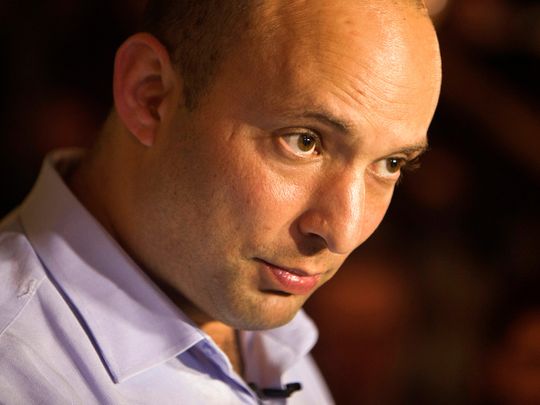
Tel Aviv: Israel is increasingly going public with its support for Ukraine while avoiding public condemnation of Russia, the primary backer of the Syrian regime, which is classified by Israel as an enemy state on its northern border.
“We are praying for the well-being of the citizens of Ukraine and hope that additional bloodshed will be avoided,” said Israeli Prime Minister Naftali Bennett on Sunday in a statement. “We are conducting a measured and responsible policy.”
He said that over the next two days, Israel will send 100 tons of water purification kits, medical drugs, tents, blankets and other humanitarian equipment for civilians in the combat zones in Ukraine and to Ukrainians attempting to flee.
Bennett also spoke with Russian President Vladimir Putin on Sunday, said a statement released by Bennett’s office.
“President Putin noted that he is ready for negotiations,” said a senior Israeli official. “Prime Minister Bennett said that Israel is ready to assist as much as required and at any time in order to help resolve the crisis and bringing the parties closer. This is due to Israel’s special status and good relations with all parties.”
On the ground, Israel stands with Ukraine. Israeli medics are offering services to refugees across the Ukrainian border, Israeli phone companies are providing free credits to Ukrainian citizens to get in touch with their family, and Israeli tech companies are assisting with evacuating Ukrainian employees.
On Saturday night, thousands of Israelis, mostly of Ukrainian descent, marched through Tel Aviv calling for the end to the Russian assault, as the City Hall was lit with the blue and yellow Ukrainian flag. In Jerusalem, a famous Russian pub named “Putin” removed its sign, after one of the Russian-Israeli owners said they “want no connection with an occupier.”
Bennett, however, has avoided criticising Russia, or even mentioning it by name.
“The heart of the Israelis is with Ukraine, no question,” said Yaakov Amidror, a former Israeli national security adviser. “We need freedom to act in Syria, to contain the Iranians. We cannot ignore the fact that they are there.”
Russia is the main supporter of Syrian President Bashar Assad to Israel’s north, and maintains a large military presence in the country. With Iranian funding and support, Syria has become a weapons way station for Hezbollah, the Iranian-backed military movement in Lebanon with an estimated arsenal of 100,000 missiles and rockets.
Iran and Russia became increasingly close allies after President Donald Trump’s administration pulled out of the Iran nuclear deal in 2018.
The outbreak of the Ukraine conflict coincides with what Iranian negotiators have called the “finish line” of negotiations to revive a nuclear deal with Iran.
On Saturday, the Russian Embassy said that its military coordination with Israel over Syria will continue, after Moscow expressed displeasure with a statement by Israeli Foreign Minister Yair Lapid condemning the “Russian attack on Ukraine” on Thursday.
Later on Saturday, the Ukrainian Embassy in Israel posted on Facebook an open call to recruit Israelis “who wish to participate in combat actions against the Russian aggressor.”
The embassy deleted the post several hours later.
In a statement Sunday, Ukrainian President Volodymyr Zelensky said that he was organising a foreign legion of international volunteers from abroad.
“They will be the key evidence of your support for our country,” he said.
Russian annexation
There are roughly 6,000 Israeli citizens in Ukraine, including an unknown number of men who have served in the Israel Defence Forces and have said in interviews with Israeli press that they intend to remain throughout the course of the war to help fight Russian forces. Many arrived to the country in the years following the 2014 Russian annexation of the Crimean Peninsula, according to Ukrainian-Israelis who are familiar with their presence but unable to talk about them publicly.
Israel has not replied to several outreach attempts by Zelensky, the only other Jewish head of state outside of Israel and whose relatives were killed in the Holocaust. Zelensky has traveled to Israel several times to visit friends and family who are now Israeli citizens, as well as to perform shows across the country in his previous career as a comedian.
On Friday, Zelensky spoke with Bennett and asked Jerusalem to host negotiations between Ukraine and Russia.
“Consistent with a policy of keeping quiet,” said Israeli Interior Minister Ayelet Shaked said in an interview on Israel’s Channel 12 on Saturday, “this issue is being dealt with.”
In a meeting between Bennett and Putin last October in Sochi, Putin refused an offer by Bennett that Israel mediate between Russia and Ukraine, according to Israeli media.
But a growing number of grassroots groups in Israel say that, as the war intensifies, their government can no longer afford to stand on the sidelines.












